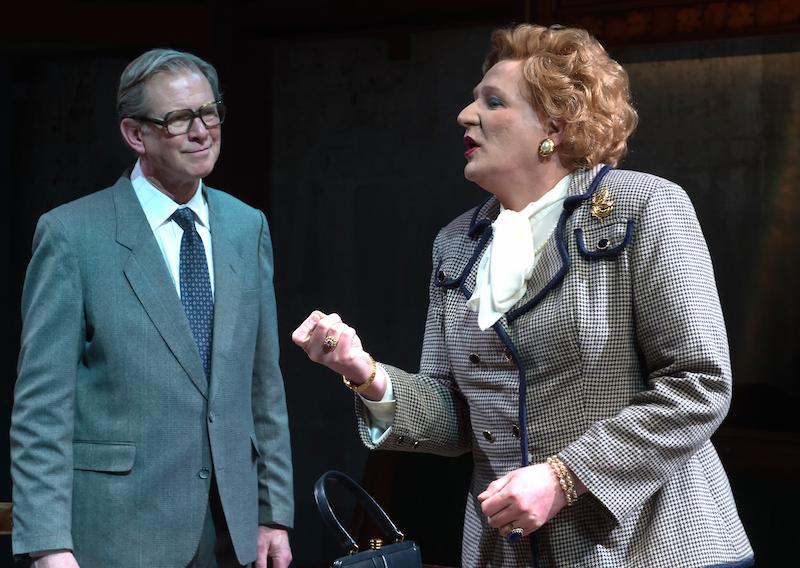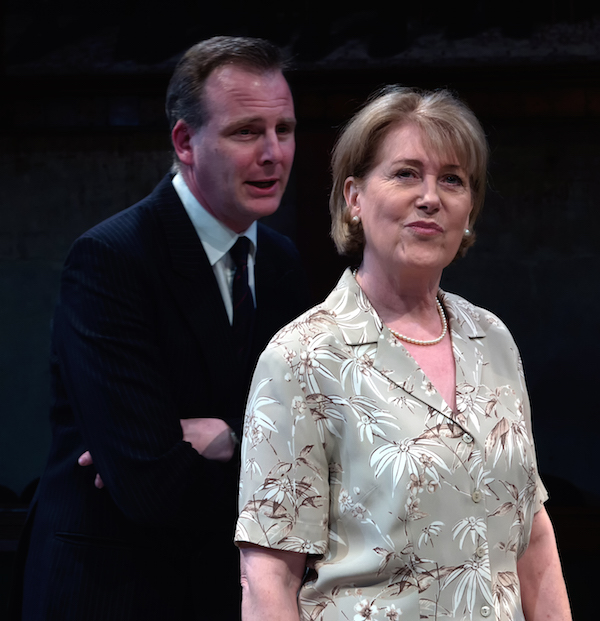Dead Sheep, Park Theatre | reviews, news & interviews
Dead Sheep, Park Theatre
Dead Sheep, Park Theatre
Political drama continues its reign, as Geoffrey Howe torpedoes Thatcher in a new play

While seven-way debate rages, broadcaster and debuting playwright Jonathan Maitland takes us back 25 years to a radically different political landscape: a time of regents, and of regicide. It’s 1990 – Thatcher the leader claiming divine right to rule, Geoffrey Howe her unexpected assassin. How did the mild-mannered Welshman, whose rhetorical powers Denis Healey compared with those of a dead sheep, become a wolf in sheep’s clothing?
It’s an intriguing question, answered with wit and insider wisdom, but too simplistic a reading in Maitland’s sketch satire-meets-modern Macbeth. Second-half solemnity forces a jarring gear change, with Ian Talbot’s pithy production hindered by previewing, recapping and ponderous pontificating. The rules of essay writing have been liberally applied: tell them what you’re going to tell them, tell them, then tell them you’ve told them.
 This persistent guiding does mean those unfamiliar with 1980s Cabinet ructions will have little trouble following, bar a few esoteric gags. The action shifts lucidly between time periods, from vulnerable early Thatcher to her honeymoon period with Howe (James Wilby), their “benign synthesis” fractured by divisions over Europe, and finally her disenchanted lieutenant’s deadly resignation speech, delivered at the urging of wife Elspeth (Jill Baker, pictured right with Tim Wallers). Morgan Large’s green Commons benches effectively place the audience in the thick of it.
This persistent guiding does mean those unfamiliar with 1980s Cabinet ructions will have little trouble following, bar a few esoteric gags. The action shifts lucidly between time periods, from vulnerable early Thatcher to her honeymoon period with Howe (James Wilby), their “benign synthesis” fractured by divisions over Europe, and finally her disenchanted lieutenant’s deadly resignation speech, delivered at the urging of wife Elspeth (Jill Baker, pictured right with Tim Wallers). Morgan Large’s green Commons benches effectively place the audience in the thick of it.
While there is something of the puppet about Spitting Image legend Steve Nallon’s Thatcher – the rigid arms, rolling head and lurching stride, like a galleon powering through choppy waters – this is not a winking, drag-act imitation, but perfectly modulated channelling, from the timbre of voice at different stages of life to the ruthlessness and fatal detachment building beneath artificial courtesy. As with Bertie Carvel’s Trunchbull, masculine physique demonstrates indomitable strength, leaving Nallon free to communicate a terrifyingly subtle form of sadism. The Medusa stare is unforgettable.
Though downtrodden Howe is nominally our protagonist, and sympathetically evoked by Wilby, Nallon’s worthy opponent, and most effective scene partner, is Lady Macbeth. Spirited Baker’s campaigning voice of compassionate Conservatism vigorously challenges Thatcher’s antifeminism and scorched-earth approach – “We must win friends as well as battles”. Maitland juxtaposes her solid marriage to Howe with his rockier political one, but the supposed equality of the former is unsettled by the relative distinctiveness of her views. In contrast, his disillusionment and conflicts of loyalty remain oft-stated, insufficiently developed, leaving him a man caught between two strong female voices rather than one finding his own. Accurate, possibly, but dramatically frustrating.
Dead Sheep functions best as sly, sprightly and unexpectedly pertinent comedy roast, with ironic predictions about breakaway Eurosceptics, inert Deputies and PMs swapping intellect for looking good on television. Maitland skewers politicians with Paxman-like efficiency: unlikely new foreign secretary John Major “doesn’t even go abroad for his holidays”. Numerous incisive cameos are punchily delivered by chameleon-like Graham Seed, John Wark and Tim Wallers; the latter’s Alan Clark, here a louche, lascivious snob, steals the show. More entertaining than truly revelatory, but a solid vote-winner.
rating
Explore topics
Share this article
The future of Arts Journalism
You can stop theartsdesk.com closing!
We urgently need financing to survive. Our fundraising drive has thus far raised £49,000 but we need to reach £100,000 or we will be forced to close. Please contribute here: https://gofund.me/c3f6033d
And if you can forward this information to anyone who might assist, we’d be grateful.

Subscribe to theartsdesk.com
Thank you for continuing to read our work on theartsdesk.com. For unlimited access to every article in its entirety, including our archive of more than 15,000 pieces, we're asking for £5 per month or £40 per year. We feel it's a very good deal, and hope you do too.
To take a subscription now simply click here.
And if you're looking for that extra gift for a friend or family member, why not treat them to a theartsdesk.com gift subscription?
more Theatre
 Edinburgh Fringe 2025 reviews: I'm Ready To Talk Now / RIFT
An intimate one-to-one encounter and an examination of brotherly love at the Traverse Theatre
Edinburgh Fringe 2025 reviews: I'm Ready To Talk Now / RIFT
An intimate one-to-one encounter and an examination of brotherly love at the Traverse Theatre
 Top Hat, Chichester Festival Theatre review - top spectacle but book tails off
Glitz and glamour in revived dance show based on Fred and Ginger's movie
Top Hat, Chichester Festival Theatre review - top spectacle but book tails off
Glitz and glamour in revived dance show based on Fred and Ginger's movie
 Edinburgh Fringe 2025 reviews: Alright Sunshine / K Mak at the Planetarium / PAINKILLERS
Three early Fringe theatre shows offer blissed-out beats, identity questions and powerful drama
Edinburgh Fringe 2025 reviews: Alright Sunshine / K Mak at the Planetarium / PAINKILLERS
Three early Fringe theatre shows offer blissed-out beats, identity questions and powerful drama
 The Daughter of Time, Charing Cross Theatre review - unfocused version of novel that cleared Richard III
The writer did impressive research but shouldn't have fleshed out Josephine Tey’s story
The Daughter of Time, Charing Cross Theatre review - unfocused version of novel that cleared Richard III
The writer did impressive research but shouldn't have fleshed out Josephine Tey’s story
 Evita, London Palladium review - even more thrilling the second time round
Andrew Lloyd Webber's best musical gets a brave, biting makeover for the modern age
Evita, London Palladium review - even more thrilling the second time round
Andrew Lloyd Webber's best musical gets a brave, biting makeover for the modern age
 Maiden Voyage, Southwark Playhouse review - new musical runs aground
Pleasant tunes well sung and a good story, but not a good show
Maiden Voyage, Southwark Playhouse review - new musical runs aground
Pleasant tunes well sung and a good story, but not a good show
 The Winter's Tale, RSC, Stratford review - problem play proves problematic
Strong women have the last laugh, but the play's bizarre structure overwhelms everything
The Winter's Tale, RSC, Stratford review - problem play proves problematic
Strong women have the last laugh, but the play's bizarre structure overwhelms everything
 Brixton Calling, Southwark Playhouse review - life-affirming entertainment, both then and now
Nostalgic, but the message is bang up to date
Brixton Calling, Southwark Playhouse review - life-affirming entertainment, both then and now
Nostalgic, but the message is bang up to date
 Inter Alia, National Theatre review - dazzling performance, questionable writing
Suzie Miller’s follow up to her massive hit 'Prima Facie' stars Rosamund Pike
Inter Alia, National Theatre review - dazzling performance, questionable writing
Suzie Miller’s follow up to her massive hit 'Prima Facie' stars Rosamund Pike
 A Moon for the Misbegotten, Almeida Theatre review - Michael Shannon sears the night sky
Rebecca Frecknall shifts American gears to largely satisfying effect
A Moon for the Misbegotten, Almeida Theatre review - Michael Shannon sears the night sky
Rebecca Frecknall shifts American gears to largely satisfying effect
 Burlesque, Savoy Theatre review - exhaustingly vapid
Adaptation of 2010 film is busy, bustling - and bad
Burlesque, Savoy Theatre review - exhaustingly vapid
Adaptation of 2010 film is busy, bustling - and bad
 Don't Rock the Boat, The Mill at Sonning review - all aboard for some old-school comedy mishaps
Great fun, if more 20th century than 21st
Don't Rock the Boat, The Mill at Sonning review - all aboard for some old-school comedy mishaps
Great fun, if more 20th century than 21st

Add comment